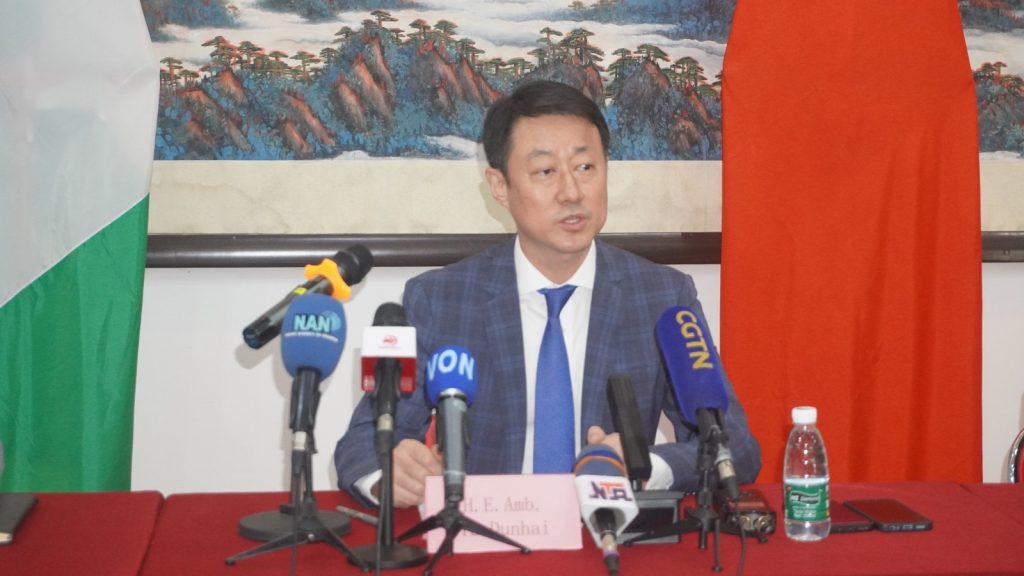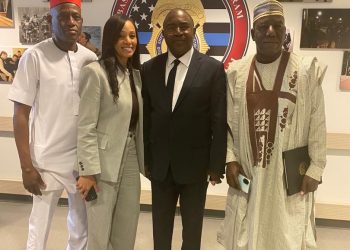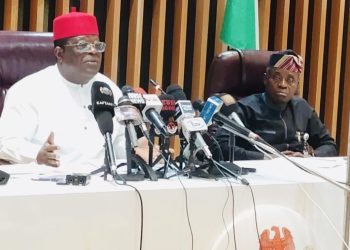By: Mnena Iyorkegh, Abuja
China has described the recent U.S. tariff increase on various nations as a step backward in global trade. It stressed that the tariffs represent a global trade war, rather than a reciprocal trade war targeting China alone.
The Chinese Ambassador to Nigeria, Yu Dunhai, stated this during a press conference in Abuja. He emphasized that the measures taken by the U.S. to address its perceived trade deficits should not be accepted.

The envoy noted that China will always defend itself against such retrogressive policies, which have a devastating impact on other nations, including African economies. He maintained that the issue should not be seen merely as a trade war between the U.S. and China, but rather as a war being waged on the entire international community.
U.S. President Donald Trump had imposed global tariffs on all trading partners, claiming that the U.S. had been cheated, resulting in massive trade deficits. This action has generated shockwaves globally, leading to currency devaluation and stock market volatility in Africa and other developing countries.
Ambassador Yu explained that China is ready for negotiations with the U.S. based on the principles of equality and a conducive environment.
“The U.S. tariff policies are particularly devastating for African nations. Using the absurd logic that ‘trade surpluses equate to cheating,’ the U.S. has launched indiscriminate attacks on African countries, violating WTO principles that grant special treatment to developing nations. This has already caused ‘collateral damage,’ such as currency devaluation and stock market volatility in Africa. The growth momentum of major African economies will inevitably be affected, with structurally vulnerable economies possibly suffering severe blows—undermining Africa’s industrialization and poverty reduction efforts.
“No country can remain immune in the face of bullying and coercion. Appeasement will only invite further aggression. The international community must unite and push back to defend our shared interests. Today, opposing U.S. tariff abuse and bullying means upholding multilateralism, fairness, and justice.”
He further stated that: “Pressure and threats are not the right way to deal with China. China has taken—and will continue to take—firm measures to safeguard its sovereignty, security, and development interests.”
The envoy explained that: “The U.S. actions severely infringe upon the legitimate rights and interests of other countries, blatantly violate WTO rules, seriously undermine the rules-based multilateral trading system, and destabilize the global economic order.”
He expressed confidence that the world’s second-largest economy and consumer market will continue to thrive, regardless of changes in the international landscape. He added that China will continue to advance high-level openness, and promote trade and investment liberalization and facilitation.
“We will foster a first-class, market-oriented, law-based, and internationalized business environment. We will share our development opportunities with the world to achieve mutual benefits”.
He asserted “In this imposed tariff war, China stands on the right side of history, and on the side of fairness and justice. We have the confidence and resolve to withstand all threats and blackmail. Domestically, we enjoy the unwavering support of our people, a vast market of 1.4 billion consumers, and a comprehensive industrial chain. China’s economy grew by 5.4% in the first quarter. Over the past decades, China has contributed around 30% to global economic growth, serving as a key engine for the world economy”, he noted
He, however, noted that the current tariff crisis provides opportunities for China-Nigeria cooperation, pointing out that the relationship between both countries is built on mutual respect, equality, mutual benefit, and win-win cooperation.
“China and Nigeria are key trade partners, with bilateral trade consistently reaching around $22 billion—among the highest in Africa. Following last year’s agreement on Nigerian peanut exports to China, China remains open to further expanding imports of Nigerian goods, signaling broad prospects for future economic cooperation.”
*As Africa’s most populous country, a major economy, and a leading voice of the Global South, Nigeria holds significant influence. China is ready to work with Nigeria to implement the outcomes of the FOCAC Summit and the consensus reached between our leaders, to deepen mutually beneficial collaboration. Together, we will uphold the multilateral trading system, resist protectionism, and foster an open, inclusive, and fair international environment.
Our shared goal is to promote an equal and orderly multipolar world and a universally beneficial, inclusive economic globalization—building a community with a shared future for humanity”, he said
He reiterated that for the world to reach its full potential, global leaders must pursue peace, development, cooperation, and shared prosperity.















